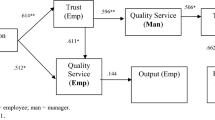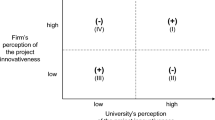Abstract
The purpose of this study is to clarify the mediating effect of the causal relationship and relationship commitment that the collaboration motive of the partners participating in the consulting project has on the collaboration performance. This study is a consultant who conducts consulting on SMB. Data was collected using an online questionnaire. It consists of a total of 30 questions, including 5 general characteristics and 25 measurement variables, and consists of a Likert 5-point scale. For the empirical analysis of the collected data, SPSS ver.22 statistical packages were used. The main analyses were frequency analysis, validity and reliability analysis, correlation analysis, and regression analysis. This study is an empirical analysis of the effect of collaboration motive of the partners participating in the consulting project on collaboration performance. Also, an analysis of the mediating effect of relationship commitment was performed. As a result of empirical analysis, it was found that the correlation between the measured variables was positive (+) and the correlation coefficient was statistically significant. The hypothesis test results were as follows: First, it was found that the collaboration motives of consulting project partners, autonomy, competence, and relevance, had a positive (+) effect on both relationship commitment and collaboration performance. Second, relevance was analyzed to have the highest impact on collaboration performance (β = 0.445***) and relationship commitment (β = 0.555***). Finally, it was found that the relationship commitment partially mediated the relationship between collaboration motive and the collaboration performance of the partners participating in the consulting project. Therefore, to increase the collaboration performance, collaboration motive of the partners participating in the consulting project is important, and the mediating effect of relationship commitment is tested, so more research is needed to strengthen relationship commitment. This study emphasizes the importance of collaboration motive for the collaboration performance of SMB consulting projects, which will be important data for consulting companies and consultants. More research is needed related to collaboration motive for future partner selection.
Access this chapter
Tax calculation will be finalised at checkout
Purchases are for personal use only
Similar content being viewed by others
References
Jap, S.D.: Pie-expansion efforts: collaboration processes in buyer–supplier relationships. J. Market. Res. 36(4), 461–475 (1999)
Hertog, P.D.: Knowledge-intensive business services as co-producers of innovation. Int. J. Innov. Manag. 4(04), 491–528 (2000)
Shin, C.S., You, Y.Y.: Study on the effect of consultant’s social-relational competency on trust and collaboration performance in the knowledge service industry. Int. J. Adv. Sci. Technol. 29(4), 163–173 (2020)
Kubr, M. (ed.): Management Consulting: A Guide to the Profession. International Labour Organization, Geneva (2002)
Lee, Y.H., Seo, Y.W.: A study on the effects of business consulting on the business performance: analysis of elasticity of consulting factors and a group analysis based on firm age. Knowl. Manag. Res. 19(4), 39–58 (2018)
Bae, Y.S., Ahn, Y.J.: An empirical study of the effects of consultant competency on the performance of management consulting: focusing on the moderating effects of the characteristics of consulting firm and client firm. Department of Business Administration, Graduate School Dankook University, Republic of Korea (2013)
Coad, A., Holm, J.R., Krafft, J., Quatraro, F.: Firm age and performance. J. Evol. Econ. 28(1), 1–11 (2018)
Fuller, M.B., Porter, M.E.: Coalitions and global strategy from. Competition Glob. Ind. 315, 344 (1986)
Mariti, P., Smiley, R.H.: Co-operative agreements and the organization of industry. J. Ind. Econ. 31, 437–451 (1983)
Harrigan, K.R.: Exit barriers and vertical integration. Acad. Manage. J. 28(3), 686–697 (1985)
Gagné, M., Deci, E.L.: Self-determination theory and work motivation. J. Organ. Behav. 26(4), 331–362 (2005)
Deci, E.L., Ryan, R.M.: The “what” and “why” of goal pursuits: human needs and the self-determination of behavior. Psychol. Inq. 11(4), 227–268 (2000)
Deci, E.L., Ryan, R.M.: The general causality orientations scale: self-determination in personality. J. Res. Pers. 19(2), 109–134 (1985)
Ryan, R.M., Deci, E.L.: Overview of self-determination theory: An organismic-dialectical perspective. In E. L. Deci & R. M. Ryan (Eds.), Handbook of self-determination research (pp. 3–33). University of Rochester Press (2002)
Allen, N.J., Meyer, J.P.: The measurement and antecedents of affective, continuance and normative commitment to the organization. J. Occup. Psychol. 63(1), 1–18 (1990)
Hardwick, B., Ford, D.: Industrial buyer resources and responsibilities and the buyer-seller relationships. Ind. Mark. Purch. 1(3), 3–26 (1986)
Hunt, S.D., Morgan, R.M.: Organizational commitment: one of many commitments or key mediating construct? Acad. Manage. J. 37(6), 1568–1587 (1994)
Dwyer, F.R., Schurr, P.H., Oh, S.: Developing buyer-seller relationships. J. Mark. 51(2), 11–27 (1987)
Parasuraman, A., Berry, L.L., Zeithaml, V.A.: Understanding customer expectations of service. Sloan Manage. Rev. 32(3), 39–48 (1991)
Song, J.J., Kim, M.J.: The effect of team collaboration and transactive memory system on team performance: focused on moderate effect of maturity. Gachon University, 1–119 (2013)
Noordewier, T.G., John, G., Nevin, J.R.: Performance outcomes of purchasing arrangements in industrial buyer-vendor relationships. J. Mark. 54(4), 80–93 (1990)
Salancik, G.R., Pfeffer, J.: A social information processing approach to job attitudes and task design. Adm. Sci. Q. 23, 224–253 (1978)
Choi, C.H., Roh, J.W., You, Y.Y.: A study on the effects of ties between clients and consultants on consulting project performance(focused on mediating effect of trust, moderating effect of consultant’s competence and client’s participation of consulting). J. Prod. Rev. 27(3), 87–114 (2013)
Baron, R.M., Kenny, D.A.: The moderator–mediator variable distinction in social psychological research: conceptual, strategic, and statistical considerations. J. Pers. Soc. Psychol. 51(6), 1173 (1986)
Mishra, S., Tripathy, H.K., Mallick, P.K., Bhoi, A.K., Barsocchi, P.: EAGA-MLP—an enhanced and adaptive hybrid classification model for diabetes diagnosis. Sensors. 20(14), 4036 (2020)
Mishra, S., Mallick, P.K., Jena, L., Chae, G.S.: Optimization of skewed data using sampling-based preprocessing approach. Front. Public Health. 8, 274 (2020)
Mishra, S., Tripathy, H.K., Mishra, B.K.: Implementation of biologically motivated optimisation approach for tumour categorisation. Int. J. Comput. Aided Eng. Technol. 10(3), 244–256 (2018)
Mishra, S., Mallick, P.K., Tripathy, H.K., Bhoi, A.K., González-Briones, A.: Performance evaluation of a proposed machine learning model for chronic disease datasets using an integrated attribute evaluator and an improved decision tree classifier. Appl. Sci. 10(22), 8137 (2020)
Mallick, P.K., Mishra, S., Chae, G.S.: Digital media news categorization using Bernoulli document model for web content convergence. Pers. Ubiquit. Comput. (2020). https://doi.org/10.1007/s00779-020-01461-9
Author information
Authors and Affiliations
Editor information
Editors and Affiliations
Rights and permissions
Copyright information
© 2022 Springer Nature Switzerland AG
About this chapter
Cite this chapter
Shin, CS., You, YY., Park, IC. (2022). A Study on the Effect of the Collaboration Motive of Partners Participating in the Consulting Project on Relationship Commitment and Collaboration Performance. In: Samanta, S.R., Mallick, P.K., Pattnaik, P.K., Mohanty, J.R., Polkowski, Z. (eds) Cognitive Computing for Risk Management. EAI/Springer Innovations in Communication and Computing. Springer, Cham. https://doi.org/10.1007/978-3-030-74517-2_5
Download citation
DOI: https://doi.org/10.1007/978-3-030-74517-2_5
Published:
Publisher Name: Springer, Cham
Print ISBN: 978-3-030-74516-5
Online ISBN: 978-3-030-74517-2
eBook Packages: EngineeringEngineering (R0)




